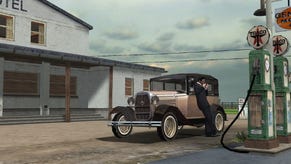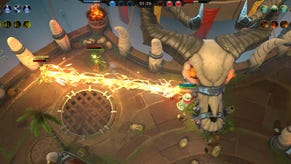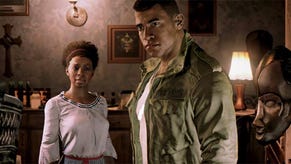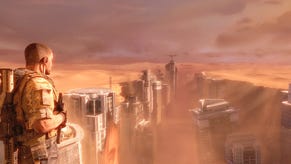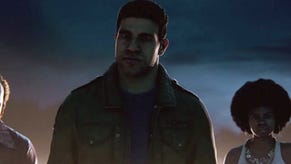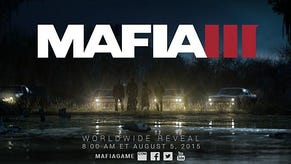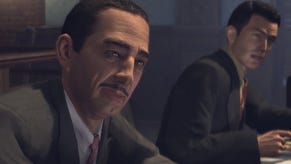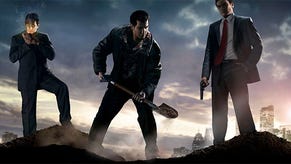Family Chat: 2k Czech's Alex Cox On Mafia 2
Last week, I finally got to spend a little quality time with the rarely-seen, much-delayed Mafia 2. While I was there, I made Alex Cox, one of the game's producers, an offer he couldn't refuse. He refused it anyway. So I decided to ask him about the game instead. Read on for the chatty chap's thoughts on the game's excellent music, open world versus linear and whether 'dickcheese' is an authentic 1950s swear word or not.
RPS: I love the soundtrack - I was just haring around 1950s New York to Buddy Holly's That'll Be The Day... Was there a conscious choice to go with more recognisable stuff than the first game, or is it just a by-product of the game being set 10/20 years on?
Alex Cox: We've spent ages on the tracklist. It's been... carte blanche isn't true, it's not like we had billions of dollars to spend on the music. But the music is obviously a big part of creating the period. I'm not a big music guy myself, but obviously other guys on the team are, and for them it's like being kids in a candy store. They have all this 50s music, and then there's the 40s music as well -being able to put all this big list together has been pretty cool for the guys. I'm not sure how many tracks there are - maybe 130? Definitely over a hundred.
Were there any tracks you wanted but couldn't have?
AC: Because it's mature, we're not gratuitous in that sort of way, there wasn't an issue of people wouldn't want to be associated because it was very violent. It's more to do with getting as many songs as we could effectively within a budget. Here's the amount of money, get the best amount of tunes. There'll be a range of tunes in there, from really iconic music to music that we just think is cool for the vibe.
RPS: Why decide to move from the 30s to the 40s and 50s with this one?
This isn't a direct sequel - the story doesn't so much follow on, but it is supposed to be the same fictional universe as the first. It's a different city, and it's moving on through the ages. It's an interesting time period for a lot of reasons. 1946, which we didn't get to see today, is interesting because the mob are exploiting wartime blackmarket, ration stamps, things like that. It's a good time for the story for Vito to come back from the war, for example, and he's poor, a load of the guys are still off at war... It's a totally different environment, and a great place for the story to give him a plausible motivation of starting to get involved in organised crime. It makes the story believable and it allows us to use the whole city as the backdrop to the story.
So when we move to the 1950s as you played today, Vito is quite heavily involved in with the Mafia right now - it's a completely different era. He's got money now, he's living the life that he always dreamt of... And there's the rock and roll soundtrack, the nice cars - all of these cool Americana things that are starting to come on more. The real-life timeline reflects the storyline again. On the one hand it's good times, happy times, things like that, but there's backdrop, that things will maybe start to go a bit sour. We used all of the things in the game to reinforce that - the story, characterisation, the selection of weapons, the clothes, things like that.
RPS: Vito just coming back from the war seems a little reminiscent of Al Pacino's Michael in the Godfather, and his best mate Joe has a touch of the Pesci about him... Presumably you're consciously nodding to your inspirations?
What we're looking to create is the feeling... we all know these Mafia movies, they're very iconic experiences for cinema. I don't think there's anything that's a direct or complete rip-off of these movies, but we want to use those touchpoints that people recognise, so they feel like they get that whole feeling of playing through The Godfather or Goodfellas, which is a cool idea in itself.
RPS: At one point, someone shouted "Bring it on dickcheese" at me. Now, is this really a phrase that would have been used in the 1950s?
[Laughs], Maybe, look it up on the internet! I'm not sure. I think in the finest tradition of mob movies there's definitely some creative swearing. "Bring it on dickcheese..." Hmm. I'm not sure whether that's an anachronism or not. Who knows?
RPS: Why did you decide to drop the speed limit system and the like from the first game?
We've had a relaxation of the rules to some degree. The original Mafia got a lot of feedback to its police system. I don't think it was wholly negative, but people did feel like the police system was pretty aggressive. What we wanted to do was keep that in principle, and again coming back to the idea of making you behave like a mob guy - mob guys don't run around rampaging in the street, doing all kinds of crazy stuff. It's a secret society, they try to avoid the police where possible, they try not to be gangsters in real life, and only when events require it the [smacks hands together] get their guns out and deal with business. What we've done is try to make it less frustrating. If you start crashing around and things like that you're going to get chased by the cops, but I think by this stage of the game - we're about 2/3rds of the way through - you know the rules of the game, you know how to manipulate the police, you know how to react to it. It'll be tough to survive and that's the goal - like it would be in real life doing these things.
It's there to play with, it's a fun diversion, but it's not the focus of the game. You can survive it, there's methods of removing your police status, you duck out of sight, you lose your recognition bar, the immediate police lose you. If you aggravate them too much, you'll get a Wanted status, which means you are personally recognised, or the car that you're driving is recognised, or both, in which case just random cops that see you in the street will start chasing you. AT which point you have to start bribing the cops, changing your clothes, spraying your car - things like that, to lose the wanted status and effectively go back to being a non-descript civilian in the street.
RPS: What's the balance between being a scripted action game and an open world? Will it still be rewarding to explore the city?
Yeah, sure. There's stuff out in the city that you can do, there's lots of interactive environments, but really the focus isn't sandbox. The focus has always been for the city to be a backdrop... From a concept point of view we're trying to recreate this cinematic gangster story. One thing that would be more challenging would be to do this in such a way that it's just a linear game progression from mission to mission to mission. Because of the concept of gangsters - they exist on the street, they require you to have a city around you, to feel the reaction of the city to your crimes, it's not just what's going to happen in a cutscene. It's adding colour to the story, I think. That's really the goal. There's gameplay there and it's fun to drive around the city, but the focus is very much on the narrative.
RPS: I was cheerily playing around opening windows and turning off lights at the start of the mission - can we expect those kinds of small interactions throughout?
What we've got, again let's conceptualise it as the features that are in the game, the things that are in the city, there'll be a point in the story that you need to do something. So you'll be told to go to a bar, and the functions of that bar are recreated as you'd expect . These are venues that exist in the city, but they're also part of the story. And things like buying some food and drink, that'll restore your health, or changing your clothes, that'll lose the cops. All of these things are there to give you the feeling of life and vitality of the city, but they're all there in design as part of the story experience. At some point in the game, these things will be used for something. There are over a hundred different buildings that you can walk into off the street...
And I have to say, they're very detailed and richly visualised interior environments that are seamlessly streamed from the open world. Which I think is a really cool thing from a technical perspective. You can go into these environments, you can shoot the place up, check out all of these detailed interiors, and walk straight out into the street again. In open world games, that's actually quite hard to achieve - everything has to be streamed, the loading is happening somewhere in the background, holding these things in memory, and all of the completely destructive environments things like that.
RPS: I must shamefully admit I died a couple of times in the big fight at the end of the mission, and wasn't overjoyed about how far back the checkpoint system flung me. Are you guys still tweaking that stuff?
Oh yeah, everything like that is still being tested and checked. But from a difficulty perspective, we want the gunfights to be quite challenging. We certainly don't want them to be frustrating. if it's a difficult moment for Vito in the story, we want the player to feel that it's a challenge, we don't want it to be a cakewalk with pretty explosions. We want it to be a challenge because the game feeds back into the story. If it's an action moment in the story, the player will have that feeling of exhilaration or challenge or danger, like you would if people were shooting at you - you'd be worried about not being shot, you'd be taking cover and not running around like a lunatic. this is the feeling that we really want to happen in this. Like you saw in this level, the villains are the Greasers - obviously they're not hardcore villains, they're not like the mafia, they're just a gang of punks.
RPS: Yeah, I found it quite brutal, almost harrowing - they're just kids, really, and most of them are running for their lives and screaming in terror as your guys chase them down.
That's the thing, exactly. When the whole thing kicks off, you're just supposed to go up there and put the frighteners on them, that's the whole point of the story, and the escalation is they start the gunfight. The mob guys don't want to go around and kill a lot of kids, but as soon as the gunfight starts, they have to finish it off. It's kind of like everyone has to die now. Sorry lads, but we can't kill one guy than leave you all to go grass up to the cops. And it's a good example of the escalation. A level is a game day - you'll wake up at the start, or you'll come into the mission in a certain way, and the game day will progress.
What we don't want is the combat or the mechanics to break the story, so by the time you get to the shootout, it feels like it's being narratively justified by the escalation of the events. So you begin with the selling of the stolen cigarettes, and that's fine - you feel like you're doing a mob thing. And then the greasers mess with you, you try to chase the guy away, then you don't know what to do next. In the story, you have to call your boss Eddie, he tells you've lost two thousand dollars of his shit, you have to pay him back. Then the emphasis is on the player to go and get the money back. You're quite desperate to please your boss. You go to beat up the greasers, then the whole thing gets into a big shootout. But it feels quite natural, it doesn't break the story, which I think is quite important.
RPS: Thanks for your time.
Except that's not all of his time, as it happens. There's a second part to this, which I'll be posting at some point next week, when my right hand will hopefully no longer be so messed up with untimely RSI that I can't carry on transcribing without breaking down in girlish tears. Yeah, you heard me, dickcheese.





